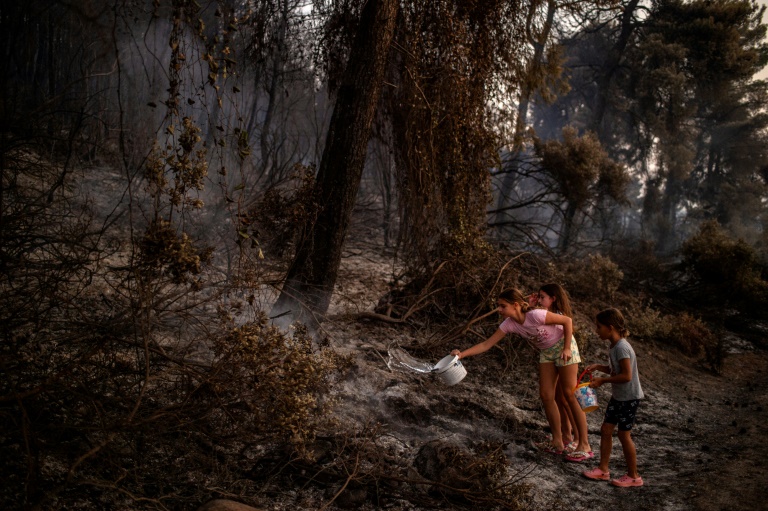Almost 900 firefighters slowly gained control of a nine-day-old wildfire on the Greek island of Evia, officials said on Wednesday, with reinforcements rushing to a massive blaze hundreds of miles to the west.
Wildfires have scorched through several Mediterranean countries in recent weeks, with Greece, neighbouring Turkey and Algeria hard hit.
Dozens have died in Algeria while the Greek blazes have killed three, left hundreds homeless and torpedoed the tourism season.
Greek officials have pointed the finger at climate change, which experts say increases the intensity and frequency of such extreme weather events.
For nine days, Greek firefighters and locals have battled a blaze on Evia, the country’s second largest island just northeast of the capital Athens.
“Yesterday, we saw the light of the sun for the first time in days,” said Yiannis Kontzias, mayor of Istiaia on Evia, referring to the thick smoke clearing away.
“I think we can say that the fire fronts are slowly coming under control.”
The focus on Wednesday shifted to Gortynia, an area 200 kilometres (120 miles) west of Athens whose forests and ravines were coming under threat from a separate 10-kilometre-wide blaze.
Regional official Christos Lambropoulos said crews were concentrating on keeping the fire from reaching the area’s highest mountain, Mainalo.
Forces in Gortynia were beefed up Wednesday to nearly 600 firefighters including crews from the Czech Republic and Britain.
However, forecasters expected rain to arrive overnight in Gortynia and the surrounding area, which could bring respite for fire crews.
– ‘Start from scratch’ –
On Evia island, locals were struggling to comprehend the loss from the fires.
“My heart has to calm down, I’ve got to start everything again from scratch,” Kostis Angelou told AFP while he surveyed the charred corpses of his 372 goats.
With the fires receiving global attention, international help has poured in.
Hundreds of firefighters have arrived on Evia from abroad, with EU states and other countries also contributing aircraft and scores of vehicles.
“When we arrived, it seemed like the whole of Greece was burning,” said Nicolas Faure, part of a detachment of more than 170 French firefighters that began arriving late last week.
– ‘Colossal loss’ –
As the immediate danger for his town receded, Mayor Kontzias said local businesses “face extinction” in coming months in a tourism season already devastated by the Covid-19 pandemic.
“We have lost the month of August, which would have sustained people here over the coming year,” he said.
“The damage is huge, and the environmental disaster will have economic repercussions for decades.”
Theodoros Roumeliotis, who represents the hotel industry on Evia, said August reservations had collapsed by 90 percent.
“It’s a colossal loss,” he told AFP.
“Right now, hotels are obliged to refund one million euros in reservations cancelled.”
Although Greece suffers from regular wildfires during hot, dry summers, this year the land area burnt has dwarfed previous years.
A draft UN assessment seen by AFP called the Mediterranean a “climate change hotspot” and said increasing temperatures and aridity had lengthened fire seasons and “doubled potential burnable area”.
Dimitris Haliotis of the Red Cross said “the entire ecosystem is destroyed” on Evia island, with hundreds of forest animals killed.
– Calls for sackings –
There have been growing calls in Greece for the resignation of top public safety officials who as recently as June had insisted that the country was well-prepared.
There was additional anger over the loss last week of much of the forest of Varibobi, one of Athens’ last remaining nature reserves.
The former royal estate of Tatoi narrowly avoided destruction in that fire.
Civil protection deputy minister Nikos Hardalias said Greece’s resources were “stronger than ever before”.
“We faced an operationally unique situation with 586 fires in eight days during the worst weather phenomenon in 40 years,” he said on Tuesday.
Greek Prime Minister Kyriakos Mitsotakis this week apologised to the nation for any possible “shortcomings” in the state’s response.
The prime minister has pledged hundreds of millions of euros in additional funds for civil protection, reforestation and flood prevention.









